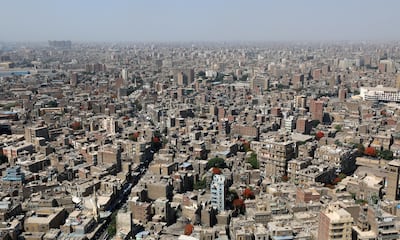Egypt's state elections commission on Wednesday sought to reassure voters of the integrity and transparency of the nation's upcoming presidential vote.
It warned, however, that anyone who tries to “deface that feast of democracy” will contend with the full weight of the law.
Ahmed El Bendary, the commission's executive director, said the date of the election would be announced on September 25. Unconfirmed media reports, however, leaked the dates on Wednesday. They said Egyptian expatriates will vote on December 1, 2 and 3, while domestic voters at home will cast their ballots on December 10, 11 and 12.
President Abdel Fattah El Sisi, a former army general first elected in 2014, has yet to say whether he plans to run for another six-year term. However, he is widely expected to do so. He has in recent weeks held a series of campaign-style rallies, which he used to defend his policies of the past nine years.
Last week, he raised the minimum wage for state employees and doubled their living allowance, a move critics associated with the upcoming election.
The election commission will stand at an equal distance from all candidates, Mr El Bendary told a televised news conference. It also appealed to the relevant state institutions and media to “abide by objectivity and neutrality and afford all candidates equal opportunities to present their programmes to the Egyptian people,” he added.

He did not say what measures the commission would take to ensure the compliance of these institutions.
“We emphasise that the commission will not show any hesitance to take all the legal measures against anyone who casts doubt about the integrity and transparency of the commission's efforts,” he warned. “The law will be implemented against anyone who seeks to deface that feast of democracy (the election).”
Mr El Bendary would only say he “appreciated” a statement issued on Tuesday by the 19-member board of trustees of the national dialogue that called for the coming presidential election to be “multicandidate and competitive”.
Mr El Sisi set up the dialogue last year to help chart Egypt's path through recommendations submitted to him for approval. Its trustees include lawmakers, journalists, academics, activists and lawyers.
The surprisingly outspoken statement, said all candidates and opposition parties should be allowed to interact directly with the public, something that has for years been curtailed by security agencies.
It also demanded that state institutions and media accord equal treatment to all candidates.
The dialogue's board said reforming Egypt's political life had become “strongly needed and risk-free after the state and society have had success in comprehensively removing the threat of terrorism and extremism” – an allusion to the wave of terrorist attacks that followed the military's ousting of president Mohamed Morsi in 2013.

Their cautiously worded statement, which made no mention of Mr El Sisi by name, echoed some long-standing demands by opposition parties for the government to provide guarantees that the presidential election be fair and transparent.
Mr El Sisi's only challenger in the last election, held in 2018 was an obscure politician who entered the race at the last minute and openly expressed his support and admiration for the incumbent.
Egyptians will go to the polls as the country grapples with record-high inflation, a crippling dollar crunch and a local currency that has shed 50 per cent of its value since March last year.
The board of trustees' statement also touched on the economy, making recommendations that mirrored some of the demands made by the International Monetary Fund when it agreed late last year to shore up Egypt's economy with a $3 billion loan.
The trustees said they wanted to see spending cuts and better budgetary control. They also called for a greater role for the private sector to “ensure competitiveness”.
The military has played a massive role in economic activity under Mr El Sisi, who says it was used in mega development projects, like building new cities and roads, to ensure timely execution.


